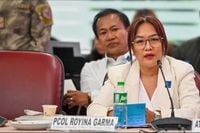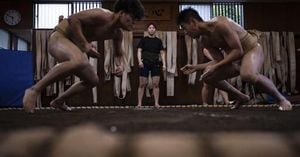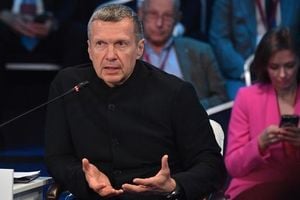Former Philippine President Rodrigo Duterte, once a dominant and polarizing figure in his country’s politics, now finds himself at the center of a historic legal battle in The Hague. For over five months, Duterte has been detained under the custody of the International Criminal Court (ICC), facing allegations of crimes against humanity stemming from his administration’s controversial war on drugs, according to reports from Philnews.ph and Inquirer. The case has sparked fierce debate at home and abroad, drawing in the current administration, legal experts, and human rights advocates—all while raising profound questions about accountability, sovereignty, and justice.
Duterte’s arrest on March 11, 2025, was the outcome of a coordinated effort between Philippine authorities and the International Criminal Police Organization (Interpol). The operation, as detailed by Philnews.ph, was not without controversy. President Ferdinand “Bongbong” Marcos Jr., Duterte’s successor, faced immediate backlash over his administration’s role in facilitating the arrest and transfer of the former leader to the ICC’s jurisdiction. Critics accused Marcos of betraying his predecessor and the nation’s sovereignty, while supporters insisted that the government was merely honoring its international commitments.
Malacañang, the seat of the Philippine government, responded swiftly to these accusations. In a statement highlighted by Philnews.ph, officials stressed that the government’s actions were dictated by its obligations to Interpol and international law. “The government had to act on the arrest of Duterte in lieu of its commitment with Interpol,” the Palace said, emphasizing that President Marcos Jr. “did not commit betrayal.” This stance, however, did little to quell the storm of public opinion, with many Filipinos divided over whether justice or politics was truly at play.
The legal proceedings against Duterte have been anything but straightforward. The confirmation of charges hearing, initially scheduled for September 23, 2025, was postponed after Duterte’s legal team claimed that he was “not fit to stand trial.” The delay has only intensified scrutiny, with the ICC Registry confirming, as reported by Philnews.ph, that it had received a growing number of applications from self-identified victims seeking to participate in the case. These applications, submitted in the lead-up to the hearing, underscore the deep wounds and unresolved grievances left by Duterte’s war on drugs—a campaign that, according to human rights groups, resulted in thousands of extrajudicial killings and widespread fear.
Amid this legal and political maelstrom, Duterte’s defense team has sought to secure a measure of comfort for their client. Nicholas Kaufman, the British-Israeli lawyer representing Duterte, publicly appealed to the Marcos administration to allow the former president to return to the Philippines on interim release while the ICC proceedings continue. Kaufman expressed his hope that Duterte could “spend his interim release in his home country until the end of the legal proceedings,” as quoted by Philnews.ph. The request, however, was met with a cold shoulder from the highest levels of the Philippine government.
Executive Secretary Lucas Bersamin, a top official in President Marcos’ Cabinet, was unequivocal in his response when questioned about Kaufman’s plea. “Who is Kaufman? I am not too sure how to respond to that because that’s outside of our purview. Whatever opinions supposed lawyers have about their respective clients, we leave it to them. We should not be made to react because we do not care about their comments,” Bersamin stated, according to Inquirer. This blunt dismissal signals the administration’s unwillingness to engage with or accommodate the legal maneuvers of Duterte’s camp, at least for now.
Meanwhile, the drama unfolding in The Hague has reverberated back home in the Philippines, where the safety of witnesses and participants in the ICC case has become an urgent concern. On September 10, 2025, the Department of Justice (DOJ) issued a public assurance that Garma, a witness involved in the proceedings against Duterte, would be provided with protection. As reported by ABS-CBN, the DOJ’s move highlights the high stakes and potential dangers facing those who come forward in cases involving powerful political figures and deeply contentious issues.
For many Filipinos, the ICC case against Duterte is more than just a legal proceeding—it is a litmus test for the country’s commitment to human rights, the rule of law, and the principle that no one is above accountability. The war on drugs, which defined Duterte’s presidency and earned both praise and condemnation, left a legacy that continues to divide the nation. Victims’ families, human rights advocates, and international observers are closely watching the ICC proceedings, hoping that justice will be served and lessons learned.
At the same time, the case has reignited debates over national sovereignty and the role of international institutions in domestic affairs. Some political voices argue that allowing the ICC to prosecute a former head of state undermines Philippine independence and opens the door to foreign interference. Others counter that international oversight is necessary when domestic mechanisms fail to deliver justice, especially in cases involving alleged widespread abuses by those in power.
The Marcos administration’s firm stance—both in facilitating Duterte’s arrest and in dismissing requests for his interim release—reflects the delicate balancing act it must perform. On one hand, it faces pressure from international partners and human rights organizations to uphold the Philippines’ commitments to global justice. On the other, it must contend with domestic political realities, including the enduring popularity of Duterte among certain segments of the population and the potential backlash from his supporters.
For Duterte himself, the coming months promise to be challenging. His legal team’s assertion that he is “not fit to stand trial” raises questions about his health and capacity, but has not, so far, swayed either the ICC or the Philippine government. The growing number of victim applications to the ICC Registry suggests that the demand for accountability remains strong, and that the case will likely continue to draw intense scrutiny from all sides.
As the legal process grinds forward, the world watches closely. The outcome of the ICC proceedings against Rodrigo Duterte could set important precedents—not only for the Philippines, but for the international community’s capacity to hold powerful leaders to account. For now, the story remains one of uncertainty, high stakes, and unresolved tensions between justice, politics, and national identity.
With the next hearing date still in limbo and the fate of a former president hanging in the balance, the Philippines finds itself at a crossroads—one that will shape its political and moral landscape for years to come.




